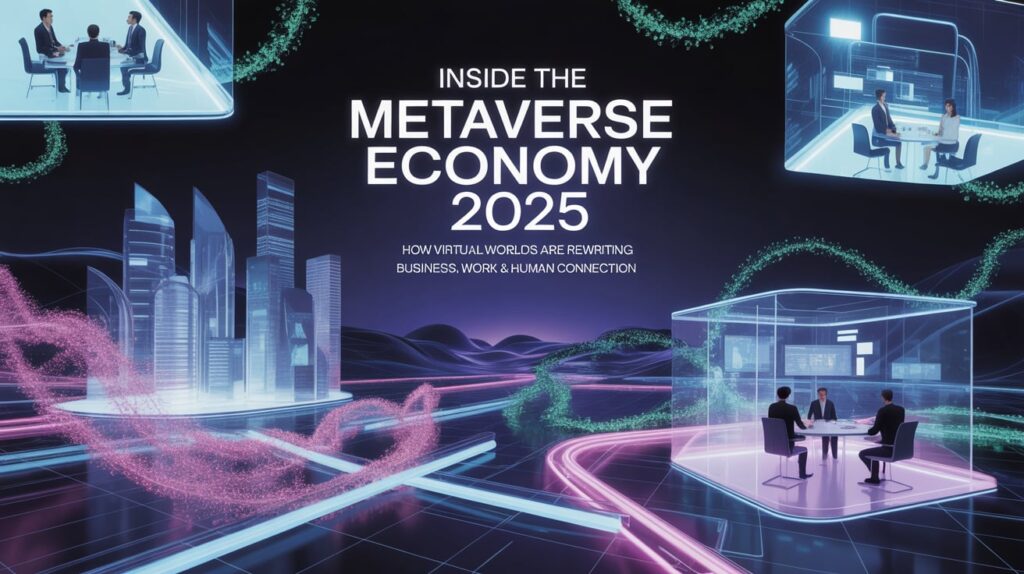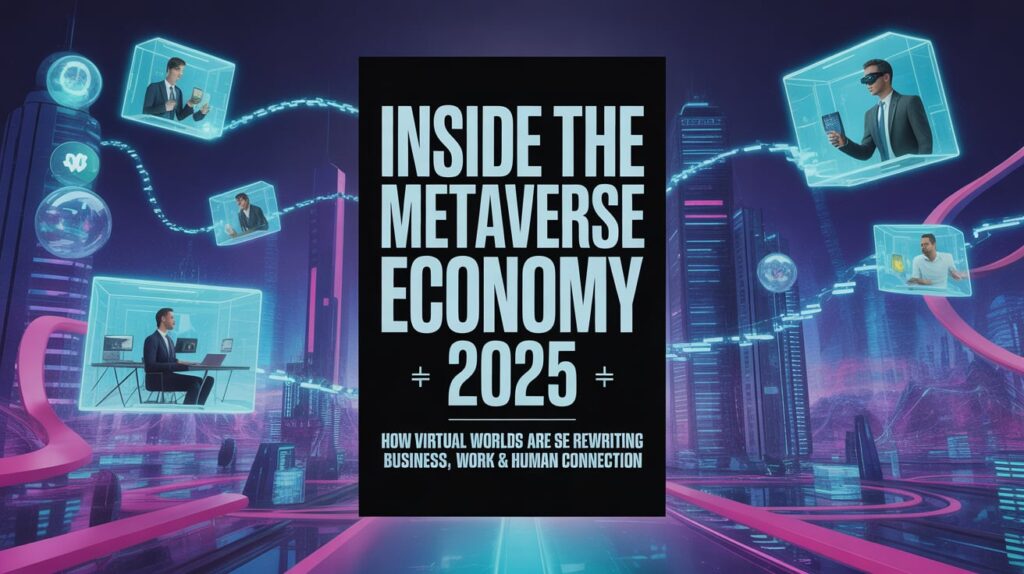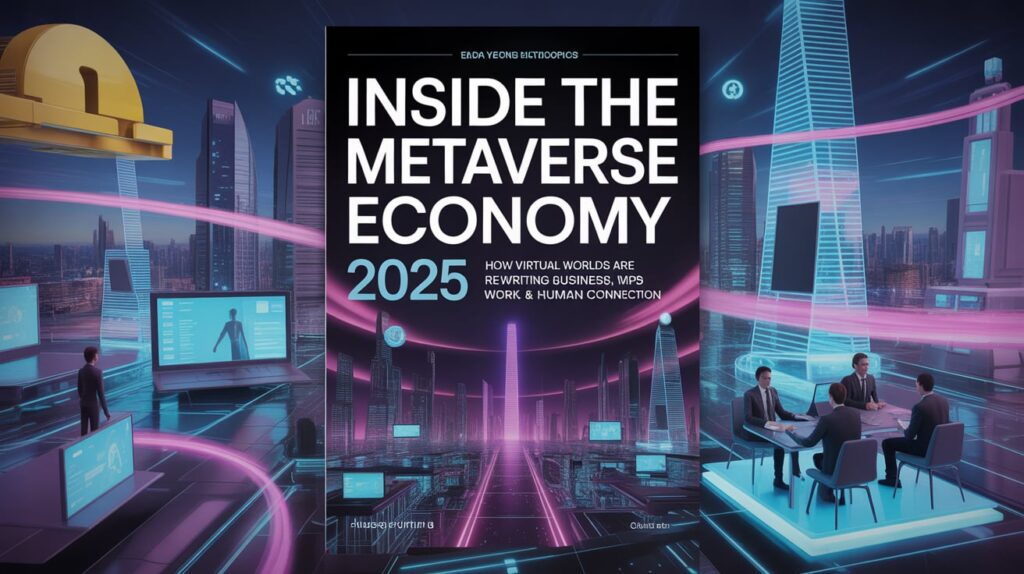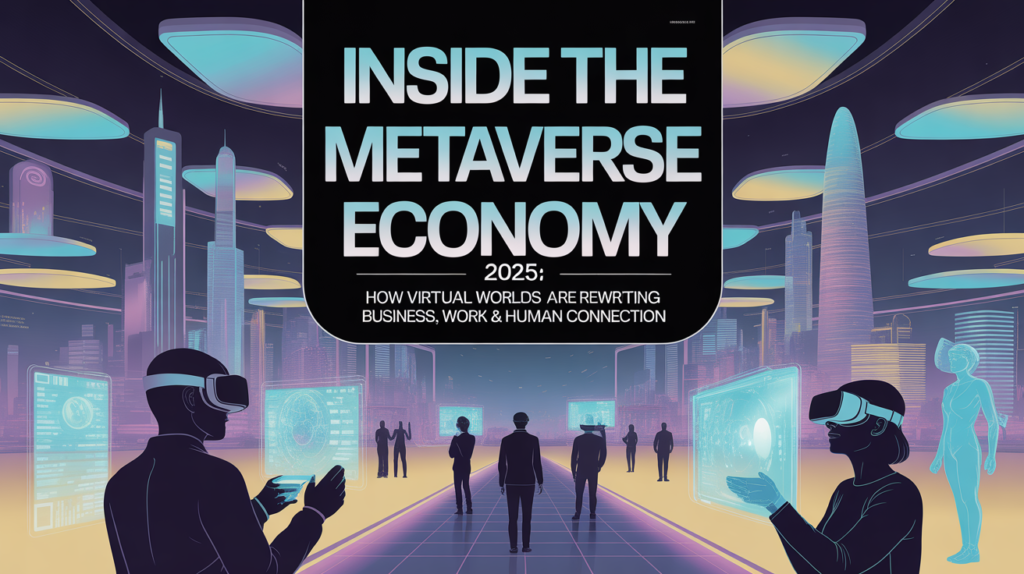Inside the Metaverse Economy 2025: How Virtual Worlds Are Rewriting Business, Work & Human Connection
The digital frontier has evolved far beyond social media and online gaming — it’s now a fully functioning economy where people live, work, and build wealth. According to BTCMARKETNEWS, Inside the Metaverse Economy 2025 reveals a world where physical boundaries fade and digital opportunities multiply.
From virtual real estate and decentralized commerce to immersive workplaces and digital identities, the metaverse has transformed into a trillion-dollar ecosystem — redefining how humans interact, trade, and connect.
What Is the Metaverse Economy?
The metaverse is a network of interconnected virtual worlds powered by blockchain, augmented reality (AR), and artificial intelligence (AI). Within it, users can buy assets, attend meetings, host events, and even earn a living — all using digital currencies and NFTs.
In Inside the Metaverse Economy 2025, this digital universe has matured into a robust economy that mirrors, and in some ways surpasses, the real one. Corporations, creators, and communities are all investing heavily in metaverse infrastructure, signaling a paradigm shift toward a hybrid existence between the physical and digital.
The Growth of the Metaverse in 2025
The numbers tell a powerful story. The metaverse market is projected to exceed $1.3 trillion by the end of 2025. Tech giants like Meta, Apple, and NVIDIA have launched advanced virtual platforms, while blockchain-based ecosystems such as Decentraland, The Sandbox, and Otherside are seeing record participation.
BTCMARKETNEWS reports that the rise of Web3 technologies and interoperable NFTs has enabled seamless asset transfers across different virtual worlds, fueling economic activity at an unprecedented scale.
Businesses now own virtual offices, artists host digital concerts, and universities conduct immersive classes in the metaverse — proof that digital living has entered the mainstream.
Key Sectors Powering the Metaverse Economy
1. Virtual Real Estate and Property Ownership
One of the most dynamic sectors Inside the Metaverse Economy 2025 is virtual real estate. Users can buy land plots, develop businesses, and rent spaces just as they would in the physical world — but on blockchain-backed platforms.
Virtual property developers are designing shopping malls, office towers, and entertainment arenas where brands pay millions in crypto for advertising and retail opportunities.
BTCMARKETNEWS highlights that prime virtual land parcels in popular worlds have appreciated by over 200% since 2023, showing how the metaverse mirrors — and magnifies — real-world economic trends.
2. The Rise of Digital Commerce
E-commerce has evolved into v-commerce (virtual commerce). Global brands such as Nike, Gucci, and Samsung now operate metaverse stores where users can purchase both digital and physical goods using crypto wallets.
In Inside the Metaverse Economy 2025, retail is no longer about clicks and carts but immersive experiences — where avatars try on clothes, attend virtual fashion shows, and make instant blockchain-verified purchases.
The integration of NFT authentication ensures that digital goods remain unique and verifiable, eliminating counterfeiting — a breakthrough in online commerce.
3. Work and Collaboration in Virtual Spaces
The future of work is virtual. Companies are now hosting meetings, team-building exercises, and training sessions in 3D virtual environments.
BTCMARKETNEWS reports that global firms are saving millions in travel and facility costs by operating metaverse workspaces. These immersive offices enhance creativity, inclusion, and real-time collaboration across continents.
For freelancers and remote workers, the metaverse provides access to global job markets through blockchain-based employment platforms, where smart contracts ensure instant, transparent payments.
4. Entertainment, Events, and Social Connection
Concerts, sporting events, and conventions have moved Inside the Metaverse Economy 2025, allowing millions to attend virtually. Artists like Ariana Grande and Travis Scott pioneered this shift, and now the trend has become an industry standard.
Virtual experiences blend AR, VR, and interactive storytelling to create hyper-immersive entertainment — where fans don’t just watch; they participate.
BTCMARKETNEWS notes that these virtual gatherings have generated over $10 billion in revenue globally, proving the metaverse’s power to redefine human connection.
5. Education and Learning 3.0
The metaverse is also transforming education. Virtual campuses, powered by blockchain credentialing, offer verified diplomas and immersive skill development programs.
In Inside the Metaverse Economy 2025, top universities are conducting lectures in VR classrooms where students explore 3D models, simulations, and historical reconstructions. This approach enhances learning retention and global accessibility.
Decentralization: The Backbone of the Metaverse Economy
At the core of this new digital frontier lies decentralization — the principle that users, not corporations, own their data, assets, and digital identity. Blockchain technology ensures that every transaction, asset, and interaction within the metaverse is transparent, secure, and verifiable.
BTCMARKETNEWS emphasizes that decentralized autonomous organizations (DAOs) now govern many virtual communities, enabling democratic decision-making and shared ownership of platforms.
This model ensures that the metaverse remains a people-powered economy, driven by community engagement and innovation.
The Role of AI and Virtual Identity
Artificial Intelligence plays a key role Inside the Metaverse Economy 2025. AI avatars act as personal assistants, customer service agents, and even co-workers. These intelligent entities help users navigate digital environments, complete tasks, and enhance productivity.
Meanwhile, digital identity verification systems based on decentralized ID (DID) protocols ensure that users control their personal data without compromising privacy.
As BTCMARKETNEWS points out, identity ownership and security are critical pillars of the metaverse, protecting users from fraud and impersonation.
Economic Opportunities and Challenges
While the metaverse offers enormous economic potential, it also introduces challenges:
-
Accessibility gaps: VR hardware remains expensive for many users.
-
Energy consumption: Blockchain networks powering virtual economies need greener solutions.
-
Regulatory uncertainty: Governments are still drafting frameworks for taxation, digital property rights, and data governance.
Despite these hurdles, BTCMARKETNEWS predicts that by 2030, metaverse-based economies will rival the GDPs of small nations — an extraordinary testament to digital transformation.
How Businesses Are Adapting
Corporations are evolving from observers to active participants. Major financial institutions now offer metaverse asset management, while marketing agencies specialize in virtual branding strategies.
In Inside the Metaverse Economy 2025, startups are creating virtual HR departments, crypto-based payroll systems, and tokenized employee rewards — bridging traditional business operations with digital-first innovation.
As adoption grows, the metaverse will become not just an alternate universe but a mainstream economic layer interwoven with real-world commerce.
Conclusion
Inside the Metaverse Economy 2025 shows that the virtual world is no longer a fantasy — it’s an economic revolution reshaping business, work, and human connection. From decentralized governance to immersive commerce, the metaverse is redefining how society functions in the digital age.
As BTCMARKETNEWS continues to analyze this transformation, one thing is clear: the metaverse isn’t just a place we visit — it’s a future we’re building together.
FAQs – Inside the Metaverse Economy 2025
1. What is the metaverse economy?
It’s a digital ecosystem where people buy, sell, work, and socialize within virtual environments powered by blockchain and AI.
2. How big is the metaverse market in 2025?
According to BTCMARKETNEWS, it’s valued at over $1.3 trillion, driven by virtual real estate, entertainment, and v-commerce.
3. What technologies power the metaverse?
Blockchain, NFTs, AI, AR/VR, and decentralized identity systems form the foundation of the metaverse economy.
4. Can people earn real income inside the metaverse?
Yes. Users can earn through digital asset creation, virtual property rentals, events, and freelance services paid in crypto.
5. What are the risks and challenges?
Energy use, data privacy, and lack of global regulation remain ongoing concerns as the metaverse expands.



